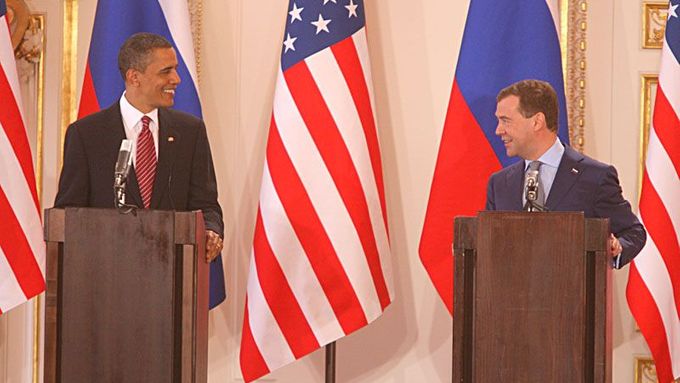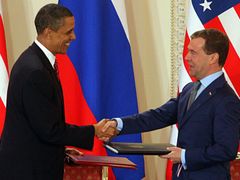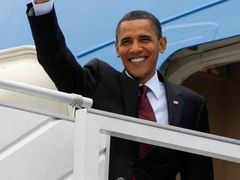Prague - The signature of the new START arms reduction treaty in Prague is over, and everybody seems to be happy with the results at first sight. But are they, really?
The answer can by surprising to many: Yes, they really are.
Both Russian President Dmitry Medvedev and US President Barack Obama got something out of the treaty, and even the Czech Republic and its capital Prague did not leave empty-handed.
After the signature, Dmitry Medvedev spoke about a "very good personal relationship and a very good personal chemistry" that had developed between him and Mr Obama. Indeed, the summit showed that the US views Russia as an equal partner. The Cold War-era fear and paranoia has been replaced with mutual respect. Could this be the beginning of a beautiful friendship?
Both states agreed to reduce the number of their nuclear warheads by one third. This will significantly ease Russia's economic pains, as maintaining the enormous nuclear arsenal can be quite costly. And even the US budget deficit will welcome some reduction in spending.
A breakthrough on Iran?
In addition, the signature is another step towards Russia's possible support for UN sanctions against Iran. In Prague, both statesmen discussed the issue, with Medvedev saying that Russia is not against the sanctions, provided they are „smart, targeted" and avoid „shock for the whole society". The Russian President added that Iran's reactions to the demands of the international community are not constructive.
This is a significant change of heart, as Moscow was until very recently known as a staunch opponent of the sanctions, with Vladimir Putin saying there was no evidence of Iran's intention to develop nuclear weapons. At home, Obama can interpret this shift in Russia's policy as his diplomatic victory.
At the same time, the treaty does not mention the US plans for anti-ballistic defense system in Europe, which Russia still sees as a threat and attempt to change the balance of power. After the plan to install the anti-ballistic facilities in Poland and the Czech Republic failed, the US thinks about deploying it in Romania and Bulgaria.
Read more: The US drops plans to base a missile defence system
Initially, Russians wanted the treaty to openly reject these plans, however they abandon this requirement eventually. Obama was thus happy to say that they agreed on regular exchange of information on risk evaluation, a joint evaluation of new ballistic missiles, and eventually the start of a serious dialogue about cooperation in the field of ballistic defense.
Win-win-win?
This concord between Medvedev and Obama was proved also by their reaction to the unexpected eruption of political violence and anarchy in Central Asian Kyrgyzstan, a host to US and Russian military bases. Both statesmen appealed for calm.
Of course, there are still many conflictive issues between Russia and the USA, but such a high degree of comfort and understanding between the old Cold War rivals (now uneasy allies?) has not been seen for a long time.
In addition, the host country, and Prague in particular, are among the winners too. Prague got its proverbial 15 minutes of fame, as it was probably the most watched city on the planet (some of the attention was stolen by Bishkek, though). Medvedev appreciated the nice whether in Prague which, according to him, reflected the warming US-Russia relations.
Read more: Obama sets out plan for nuclear free world
Klaus: „Bigger than expected"
Czech President Václav Klaus said in his statement that the summit was even bigger event than expected.
Of course, there will be critics. Some will say that the reduction of nuclear arsenal of the US and Russia will encourage smaller states to pursue their own weapons, and that, on the contrary, having a mighty nuclear arsenal is the best way to avoid nuclear holocaust.
Others, above all in Central and Eastern Europe, will complain about Washington sacrificing its NATO and EU allies in the region to Kremlin. But even these critics have something to be happy about. After signing the treaty, Obama met with 11 representatives, PMs or presidents, of new NATO member states. The US president assured them that his more positive attitude towards Russia does not mean that the US obligations towards the allies in the ex-Soviet Bloc will be neglected.


